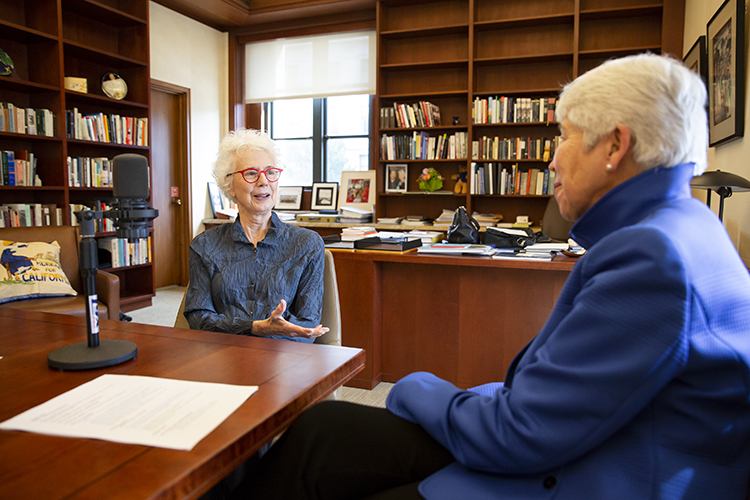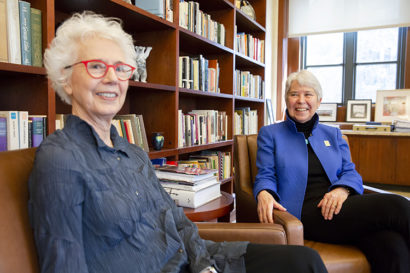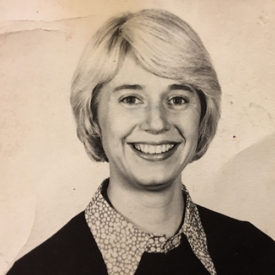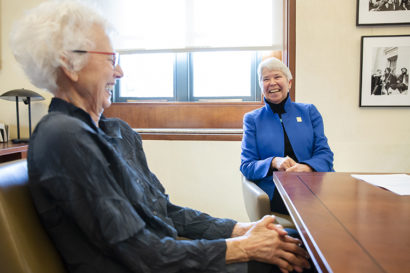Chancellor Carol Christ: ‘I always felt like a pioneer’
UC Berkeley Chancellor Christ talks with a longtime colleague and friend about what it was like for women in the academy 50 years ago and how it has changed.
July 9, 2021
While Fiat Vox is on summer break, we have been revisiting some of our favorite episodes. Today’s episode, originally released in April 2019, is a conversation between UC Berkeley Chancellor Carol Christ and Professor Emerita Carol Clover about what it was like for women in the academy 50 years ago and how it has changed. They also discuss what it takes to be a strong leader and offer advice to the next generation of Berkeley women.

Professor Emerita Carol Clover (left) and Chancellor Carol Christ first met at UC Berkeley in 1970. (UC Berkeley photo by Brittany Hosea-Small)
Read a transcript of Fiat Vox episode #80: “Chancellor Carol Christ: ‘I always felt like a pioneer.'”
Intro: This is Fiat Vox, a Berkeley News podcast. I’m Anne Brice. While Fiat Vox is on summer break, we have been revisiting some of our favorite episodes. Today’s episode, originally released in April 2019, is a conversation between UC Berkeley Chancellor Carol Christ and Professor Emerita Carol Clover. OK, here’s the episode.
[Music: “Spunk Lit” by Blue Dot Sessions]
Narration: I recently sat down with UC Berkeley Chancellor Carol Christ and her longtime friend and colleague Carol Clover, a professor emerita in the Departments of Scandinavian Studies and Film Studies. They first met at UC Berkeley in 1970.
In this conversation, they discuss what it was like for women in the academy 50 years ago and how it’s changed, what makes a strong leader — and offer advice to the next generation of Berkeley women.
Anne Brice: Chancellor Christ, why did you want to have a conversation with professor Clover?

Carol Christ in 1994. Christ served as UC Berkeley’s executive vice chancellor and provost from 1994 until 2000. When Christ joined the faculty at UC Berkeley in 1970 as an assistant professor in the English department, she was the fourth woman to join the department, which had 84 faculty members at the time. (UC Berkeley photo by Jane Scherr)
Carol Christ: Carol and I have known each other for almost as long as I’ve been at Berkeley. So, it’s almost 50 years that we’ve known each other. We have careers where there are many parallels, but also some different paths that we took.
I first came to campus as an assistant professor in 1970 in the English department. So, I guess I met Carol shortly after I came to campus. With the exception of the time I spent as president of Smith College from 2002 to 2013, I’ve been here for my whole career.
Carol Clover: I first came to campus as an undergraduate in 1960. I got my B.A., M.A. and then my Ph.D. here. Then, my first job was at Harvard. So, I went there in 1971 and came back as soon as possible in 1977. Then I had to go back and finish up a year at Harvard, but then I came back to Berkeley for good in 1979.
Anne Brice: When you both first got to Berkeley, what was it like for women on campus?
Carol Clover: I came as an undergraduate. And there were other women undergraduate students. What was hard was actually having two children by the time I was a junior and also being a single mother at the age of 25. So, I did all of my work with children. That was really hard.

Carol Clover sits in a library at a graduate seminar at UC Berkeley in 1967. She earned her B.A., M.A. and Ph.D. from UC Berkeley. (Photo courtesy of Carol Clover)
But, again, there were certainly other women students. What there weren’t, what I never had, was a female professor. There were no women above that I ever saw, above the level of students.
Carol Christ: When I joined the faculty, only 3% of the faculty were women. When I joined the English department, there were 84 faculty in the English department — it was much bigger then than it is now — and there were four women. I was the fourth woman. And I remember whenever I went to an office, people didn’t believe I was a faculty member.
Carol Clover: Or, when I went to Harvard, people always thought that I was a secretary in my office. They would just walk in and say, “Would you please type this for me and have it for tomorrow?”
Anne Brice: What would you say?
Carol Clover: Oh, I don’t remember. It would be a nice conversation. They were usually apologetic. It was just the way things were.
At the Faculty Club at Harvard, the dining room was for men only. And the women, wives and so forth, had to eat in the hallway, where there were tables lined up along the wall. Even female faculty did not eat in the main dining room. But I remember going in one day for lunch with a woman professor friend visiting from Texas. It just crossed our minds that we would ask to sit in the main dining room. So, at the front desk we asked, “Is there any chance we could sit in the main dining room?” And the little woman in charge of seating said, “Certainly.” And she very strongly walked in and put us right at the best table in the room.
I believe we integrated the Faculty Club then — without intention and without any fanfare. We were stared at, but nobody gave us any grief about it. So, it happened.

When Clover and Christ both began in academia in the early 1970s — Clover at Harvard and Christ at Berkeley — people often didn’t believe they were faculty members. “People always thought that I was a secretary in my office,” says Clover. “They would just walk in and say, ‘Would you please type this for me and have it for tomorrow?'” (UC Berkeley photo by Brittany Hosea-Small)
Carol Christ: At the Faculty Club at Berkeley, women were not allowed. I think it was either 1970 or 1971 when women were allowed in the Faculty Club. There were photographs I’ve seen from the 1960s in which meetings are taking place inside the Faculty Club, and women are sitting on the window sills with their feet outside, leaning in through the windows to hear the meeting.
Carol Clover: Oh, my. That’s great.
Carol Christ: So, that’s why there’s a Women’s Faculty Club at Berkeley. Women were not allowed in the Faculty Club. It always shocks me that it was that late that the Faculty Club became coed.

Christ says it wasn’t until she came back to UC Berkeley in January 2015 after serving as president at Smith College from 2002 to 2013 that she realized how “male-inflected” the culture at Berkeley still was. (UC Berkeley photo by Brittany Hosea-Small)
Anne Brice: Did you have a sense that it was certainly unfair? Or was it also a sense of, this is how things are? How did you feel at that time?
Carol Clover: Well, it took a while to register that there were no women. I’m not sure that I thought of it as natural, but it took me a while for it to sink in. Especially when I was getting my Ph.D. At that moment, I realized it was rare. It was odd.
Carol Christ: That’s a really interesting question. I mean, because I did my graduate work at Yale, I was so used to feeling marginal in a very privileged, wealthy, male environment that when I came to Berkeley, it felt so liberating to me. The whole culture felt so liberating that I think I wasn’t as attentive then as I would be now to the way in which there was a kind of stratified sexism.
The undergraduate student body, the graduate student body, had a very good balance. There wasn’t a sense that men and women were treated differently. But in the faculty, there were very few women. I always felt like a pioneer, in part, because I’m of the generation of the feminist revolution.
So, paradoxically — this is a little bit embarrassing to say — it wasn’t until I came back to Berkeley from being at Smith for 11 years that I realized how male-inflected the culture still was.

Carol Clover in 1976 during her time at Harvard as an assistant professor. She came back to teach at Berkeley in the late 1970s, where she became a professor in the Department of Scandinavian Languages and Literatures and the Department of Rhetoric. (Photo courtesy of Carol Clover)
Carol Clover: Harvard is like Yale. It’s a very male place, as suggested by my Faculty Club story. Berkeley is so much larger than Harvard and Yale. It’s so much more varied and it’s kind of culturally richer in some sense. It felt better to me.
And by the time I got back in the late 70s, things had changed. Things were very much changing — this was in the 80s, with women’s movements. To have the Women’s Studies Program, to have courses on women’s issues and to have the women’s center. And to start the Beatrice Bain Research Group — we created that and named it. We got funding for it, and we had a funky little building on campus to bring scholars here. It took a lot of time to create those things. It took a lot of work and kind of institutional juggling to make it happen.
Carol Christ: Yeah. We were both involved in the creation of women’s studies. I remember when I first got interested in the curricula that concerned women’s issues, there was an organization called the Feminist Press that published syllabi of courses that had a feminist focus. They came in a plain brown paper envelope. And I remember the first of these was 50 courses across the country.
So, it was a revolution in our time that we both participated in that began as something new and revolutionary is now just part of the texture of the social sciences and humanities. I can’t imagine a department that doesn’t see questions about gender as absolutely fundamental to the discipline. But they were unusual, revolutionary in the late 60s and early 70s.
Anne Brice: How do you define feminism, and do you consider yourself feminists? Do you think that what it means has changed?
Carol Clover: I certainly regard myself as a feminist and long have, since the 60s. What it means to me is simply equal rights and equal access. And, of course, the emphasis has changed over time. It’s still changing, and sometimes I feel like I’m not fully in sync. But basically, at heart, I would say I’m a feminist.
Carol Christ: Yeah, I would say the same thing. I would also define feminism as commitment to gender equity. But it’s become much more complicated, I think. The term people often use — intersectionality — the really complex relationship of feminism to categories of race and class on the one hand, and to sexual orientation, indeed, even gender identity itself, has really complicated and changed the movement, if you can even call it a movement.
I’ve often been dismayed that women students don’t like to be called feminists, don’t regard themselves as feminists. Though if you ask, “Do you believe in equal rights? Gender equity?” They say, “Of course.” Like it’s a given.

Christ speaks to reporters at a UC Berkeley press conference in 1993. Christ says it’s important that a leader has a vision of where they’re going; is a good listener; has moral courage; is willing to make decisions; and can change direction when necessary. (UC Berkeley photo by Jane Scherr)
But they associate feminism with a certain kind of emotional register. They think of it as, you know, man-hating, bra-burning, angry temperament, which was never my temperament. I know it was part of the feminist movement, but it was never what feminism meant to me.
Anne Brice: What do you think makes a good leader?
Carol Christ: I think there’s not a single characteristic that makes a good leader. I think there are many different ways of being a leader. There are some capacities that I think are really important in being a leader.
One is to have a vision of where you’re going. I always say to people I mentor or counsel, “Think of four to five things that you want to accomplish, and figure out how you’re going to accomplish them.” You have to be able to share authority as a leader, because in any complex organization, you can’t do things just by yourself. You depend on other people to try to get them done. You have to be a good listener to be a leader. You have to have moral courage to be a leader.
For a job like this, there are certain elements of the job that are very public and presentational, and you have to be comfortable projecting yourself in gatherings of various sorts.
And I do think decisiveness is one of the important characteristics of being a leader. Being willing to make decisions. But I think also being willing to say, or admit, that you’re wrong or to change direction is important as well.
There was an op-ed that was enormously encouraging to me by Frank Bruni in the New York Times, in which he was talking about women of a certain age in positions of authority. It was right after Nancy Pelosi had done such a masterful job of handling Trump.
And he was taking issue with the view that was certainly articulated in relationship to Nancy Pelosi — she’s too old for this job — by saying age brings certain strengths. And you see it in judgement and maturity and wealth of experience. And since I’m about to become 75, I took this much to heart.

“I’m much less frightened than I was when I was younger,” says Christ. “It’s much easier for me to speak my mind. I realize I have a position that encourages me to speak my mind. But to me, it just seems like there’s no time to waste and so you need to cut to the chase quickly.” (UC Berkeley photo by Brittany Hosea-Small)
Anne Brice: We’ve talked about how you’ve seen things change in the past 50 years. Where are things now compared to when you started in the academy? And what still needs to happen?
Carol Christ: Interestingly, I think at this moment, looking at the #MeToo movement, we might say, “Oh, things are worse than they’ve ever been.” I actually think women’s willingness to come forward and say, “This happened to me, and it was wrong,” rather than feeling ashamed and hiding it and thinking, “I must have done something to invite this,” is a mark of progress. But whenever you hear these stories, you realize how many worlds there are in which there is still an enormous imbalance in power in relationship to gender.
I think also lots of the issues have to do with race and class and wealth inequality. So, in some sense, I think that women in the academy — although it’s not true that there are not any problems in the academy in relation to gender — it’s one of the places where there’s been a lot of progress.

Christ has two pieces of advice for the next generation of women at Berkeley: Get in touch with your authentic self and find a vocation that you enjoy. “If something isn’t working for you, stop it and try something else,” says Christ. “I think one of the most profound gratifications we have is to find work that matters to you, whatever that work is.” (UC Berkeley photo by Brittany Hosea-Small)
Anne Brice: What’s your advice for women now — undergraduate and graduate students, and other women at Berkeley?
Carol Christ: One of the things that surprised and delighted me when I went to Smith was how the range of female behavior seemed so much wider to me than it did at Berkeley. And I’m thinking, “This is crazy.” I mean, Berkeley’s not exactly a place of shrinking violets. It has a pretty Bohemian culture. And yet, the fact that this was an all-women’s community freed women to be unconventional in their expression of themselves. So, women were louder, they were gigglier. That really was a profound realization.
And, I guess I have two pieces of advice. Get in touch with that authentic self, whatever it is. And the other is, I think it’s so important for everybody to find a vocation and to not feel like you have to get it right in your first job after college. If something isn’t working for you, stop it and try something else. I think one of the most profound gratifications we have is to find work that matters to you, whatever that work is.
[Music: “Rabbit Hole” by Blue Dot Sessions]
Carol Clover: Yeah, I think that’s extremely good advice. Do what you want to do.
Narration: That was a conversation between UC Berkeley Chancellor Carol Christ and Professor Emerita Carol Clover. This is Fiat Vox. I’m Anne Brice.
You can listen to Fiat Vox on Apple Podcasts, Spotify or wherever you find your podcasts.